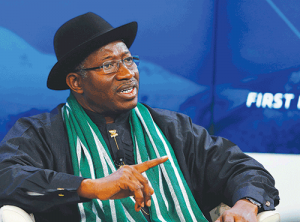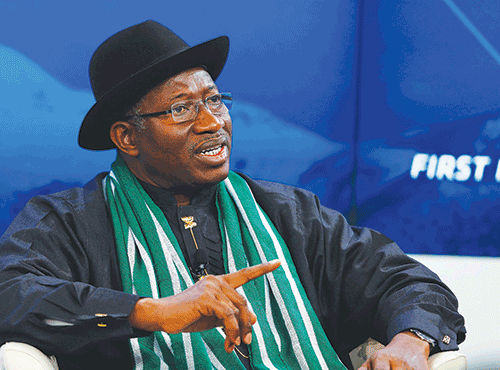From the Synagogue tragedy to the now publicly acknowledged Washington’s tepidity in the fight against insurgency, compounded by the $9.3 million botched secret arms deal, August was indeed a horrible month in the diplomatic front, writes Special Correspondent, SAM NWOKORO.

It may seem that for the first time since his assumption of the presidency, President Goodluck Jonathan has come into some messy situations he did not bargain for. Certainly, it is not a sign that he has become a lame duck. Far from it. Rather, a sequence of unforeseen events seems to be rattling the president’s resolve to bring the terrorism plague ravaging the North East part of the country to a satisfactory end.
On his own
First, his optimism that Washington, Nigeria’s foremost ally, would co-operate effectively in bringing the insurgency problem to an end before 2015 elections appears dashed when the White House, after initial demonstration of concern, later wavered.
When, in May, the United States of America (U.S.A.) provided satellite-guided drones to track the location of the kidnapped Chibok girls by Boko Haram operatives since April, expectations were high that, within days, the Chibok girls kidnap saga, which rattled his presidency would be over, marking a spectacular feat in the war against insurgency.
Alas, within weeks after the deployment and searches, Washington came up with an explanation that it would not overly interfere with Nigeria’s territorial integrity nor go beyond reasonable extent in helping Nigeria’s fight against insurgency, but would provide satellite surveillance, training of Nigeria’s armed forces in counter-terrorism warfare and other technical support services. Nigeria expected that the U.S. would help with all necessary information regarding the whereabouts of the kidnapped Chibok girls and related matters.
Perhaps, government did not envisage that the total import of that shift in Washington’s position is that U.S. anti-terror co-operation will be limited to only search and not even divulging its surveillance findings to Abuja.
Only penultimate week, the U.S. embassy in Lagos confirmed to TheNiche that Washington decided not to share intelligence information about the whereabouts of the abducted girls because it does not trust the Nigerian government to keep secrets.
According to the report, “America says it has given Nigeria $2.032 billion (about N329 billion) in the past three years to fight insurgents, including Boko Haram. But there is no word on intelligence sharing because Washington does not trust Abuja to keep secrets.”
Commenting on this development, foremost scholar on international relations, Professor Alaba Ogunsanwo, told a Lagos-based tabloid that: “Washington’s statement would not be surprising, given that local media has variously reported the administration’s confessions that there are even Boko Haram sympathisers within the government and its security agencies.”
Implication of Washington’s action
Washington’s clear wavering on total disclosures and even direct military intervention, contrary to earlier expectations, means that for the better part of the anti-terror campaigns this year, the Nigerian armed forces had been fighting the battle alone. If at all there were anything like multilateral coalition, which countries like U.S., Britain, France, Canada, Israel and China promised, such assistance has not been felt, at least not at a level Nigerians had expected.
For Dr. Chris Nwankwo, an activist, people expected that with this wide coalition built by the government against Boko Haram, the battle would be over in a matter of days.
“Unfortunately, that did not happen. We know that terrorism today is a global plague. But we also know that in the conduct of international diplomacy, Nigeria has no power to dictate the tenor or extent of assistance. So the only option of approach for Nigeria is to continue to push and build more coalition. Each ally’s level of involvement is determined by each one’s strategic interest. But you don’t expect them to say so.”
AU buffer
The Nigerian government’s determined involvement in African Union (AU) anti-terrorism fund is seen as a buffer to make up for the seeming ineffective assistance from her foreign friends. There is this perception that the anti-terrorism fund, which the AU is launching, is aimed at minimising dependence on foreign military assistance in the fight against terrorism in the region to hedge indirectly re-colonisation of Africa.
The $9.3m botched arms deal
Another page of Nigeria’s diplomatic embarrassment in the month of August/September is the botched secret arms purchase deal from South Africa. The $9.3 million (about N1.5 billion) cash packed in several suitcases was seized at the Lanseria airport following the luggage search. The private plane of the President of Christian Association of Nigeria (CAN), Pastor Ayo Oritsejafor was used to convey the money.
The South African authorities seized the money, saying it has the trappings of money laundering, as it exceeded cash limit permissible outside the banking hall. Besides, the country said the arms dealer involved is not licensed to sell arms.
Local media in South Africa have written critical editorials condemning the secret arms deal because it embarrassed Nigeria in the global community. An attempt by the nation’s parliament to probe the appropriateness of the deal met with opposition boycott of proceedings, giving them one more point to pillory a government it has been unrelenting in criticising.
However, Nigerians have been wondering the essence of the secrecy, since it is no more news that its military is contending with the problem of inadequate fire power against fundamentalist insurgency in the North East. The presidency has also not helped matters by not coming forward with any rational explanation.
Could it be that the government did not want the insurgents to know it is acquiring new weapons? And if so, what is the need? This one has also rubbed a pretty bad ointment on Nigeria’s image in the international arena.
Those who claim to know say such huge transactions are done through the Central Bank.
U.S. arms deal blockade
Yet another unsavoury page in the spate of faux pas in Nigeria’s diplomatic relations is the reported blockade of Nigeria’s effort to purchase some Chinook tactical helicopters from Israel. Washington, which exercises diplomatic leverages over Israel, reportedly blocked the deal, even after Israel had agreed to sell the helicopters for troop deployment, supply and rescue. Government has neither explained the issue nor denied anything, worsening, as it were, Nigeria’s profile in the eyes of her foreign partners.
Could Washington’s move be interpreted as jealousy or as a tactical measure in its anti-terror collaboration with Nigeria? No one knows yet.
The Synagogue crisis
Also, within the month of August and September, a popular Pentecostal Church in Lagos known as Synagogue Church of All Nations (SCOAN) had one of its building structures collapse on hundreds of worshippers that included foreign worshippers. The foreign victims are mostly from South Africa, one of Nigeria’s foreign allies. At the last count, more than four score South Africans lost their lives in that tragedy which rattled not only the Nigerian government but also the government and peoples of South Africa. President Jacob Zuma of South Africa has already condemned the loss of his subjects.
Nigeria was embarrassed by the collapse, obviously because the nationals of other friendly countries were victims. But for the cordial relations between Nigeria and South Africa, the former would by now be having diplomatic row with that country.
Aggrieved South Africans have already demanded that the presiding pastor of the church be banned from entering into South Africa where branches of SCOAN exist. The ‘prophet’ has also not helped matters by his serial gaffes, attributing the building collapse to attacks from perceived enemies, which he has not been able to prove with substantial evidence. Last Sunday, the founder of SCOAN, Temitope Joshua, insisted that the building collapse was “controlled demolition”.
The president personally visited the church, and, apparently preempting the implication of the tragedy, vowed that the matter would be probed. Lagos State Governor, Babatunde Fashola, promised same.
However, preliminary findings by Lagos showed that more floors were added upon a foundation laid for a two-storey building with inferior steel beams which fall short of construction industry recommendations.
$1b loan to fight terrorism
And within the same period in review, the National Assembly, after much dithering, finally gave a go-ahead to the president to borrow $1 billion for “the fight against insurgency”. The president had been ‘crying’ to the federal legislature for that loan.
Notwithstanding, there is general perception that the loan could serve more for post-Boko Haram re-orientation and economic empowerment of the North Eastern part of the country currently under emergency rule due to Boko Haram activities. Sweet as the development may sound, it has vindicated the claim of recently court-martialled soldiers that the army was ill-equipped to fight the insurgents.
Political pundits believe that the loan and the Marshall Plan kind of economic reconstruction of those states currently under emergency rule (Borno, Yobe and Adamawa) is the only practical way the Jonathan administration can absolve his government of the allegation by the opposition that the current laissez-faire system is skewed against Muslim youths.
According to the Head of Department (HOD), Philosophy at the University of Lagos (UNILAG), Dr. Douglas Anele, “the present Muslim youths must have to be disentangled from the stranglehold of feudal oppression and subjugation by the caliphate as a way to veer them into modern ways of life in the 21st century.”
He posited that the present level of fundamentalism in the Northern part of the country is a product of failed ideology and indoctrination which only massive education can tame.
The government of President Jonathan has repeatedly said that its Transformation Agenda is total, all-embracing, and would ensure that all sections of the country are carried along.
Pesky knot
As the election year draws near, it appears that any unsavoury event in the land has become a veritable campaign subject by the opposition parties. Perhaps, that is why the presidency seems ever alert these days to issues and events that, if it were in the days gone by, leave such in the public domain from where it emanated.
This posture, particularly, explains his visit to SCOAN shortly after the tragedy. One presidential insider squealed to the TheNiche during the week that the presidency is not unmindful of these unsavoury events at this electioneering season, as it has vowed to “get over them”.














